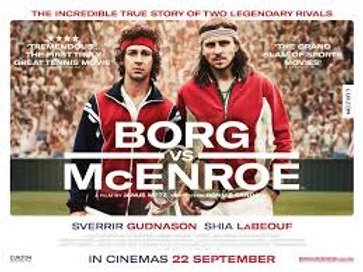
There are great moments in life, many of which fall in sport. And there are some great films. But to assume that a great moment in sport automatically translates to the cinema is a serious flaw, as the new Borg vs McEnroe film proves. I only hope it doesn’t put people off for the imminent Battle of the Sexes film which ought to be vastly better – and more socially valuable.
There’s no question the Wimbledon final of 1980 between Björn Borg and John McEnroe was one of the greatest-ever tennis contests. I don’t know anyone who wouldn’t put it in their all-time top ten matches. But does that make for a great film? I could have answered that before I spent two hours of my life that I’ll never get back by watching Borg vs McEnroe, the Swedish film that looks at the threat McEnroe posed to Borg’s hegemony in the tennis world at the end of the 1970s.
Yes, it was a great match, and yes Borg and McEnroe presented very different characters on court. But for a sporting film to have any drama to it, there has to be a wider story – it can’t just be about one match. And the drama wasn’t there when Borg played McEnroe, other than straight sporting drama. The reason is that Borg was the one player McEnroe never lost his cool with – he respected Borg so much there was never any “You cannot be serious”, “Chalk flew up” etc in their matches. That means the main area of tension is knocked on the head from the start, so I can’t see how you can make a good film out of it.
If one wanted to make a movie out of a tennis match, the 1975 Wimbledon final between Arthur Ashe and Jimmy Connors would be much better. At the time, Connors was suing the Association of Tennis Professionals whose president was Ashe. So apart from Ashe being the first black Wimbledon champion, Connors being an overwhelming favourite, and Ashe beating him with a match strategy that was totally against how he normally played (he knew his normal game of pace would suit Connors, so Ashe played with no pace – ‘gave him junk’ as it was described – and it flummoxed Connors completely), they were facing each other across a net while waiting to face each other in a courtroom. That would make for a good film, not just a great tennis match.
I was with Borg and McEnroe in Prague the weekend the film was released. McEnroe slammed it, but I suspect that was because he doesn’t like the way he was portrayed (and Shia LaBeouf doesn’t quite get the restlessness right). Borg was more measured, perhaps because he had more dealings with the film – his son Leo plays the young Björn, and plays him very well. But Borg was clear it’s a work of fiction. “If they had talked to us we could have told them certain things that happened,” he said, “but they didn’t, they just made things up to make for a better film, so there are lots of things in it that simply aren’t true.” You don’t have to be Borg or McEnroe to know that – some of the inaccuracies are glaring, and some conversations would never have taken place.
There’s a second tennis film due out later this year, which looks much more promising. It’s about the Billie Jean King vs Bobby Riggs ‘battle of the sexes’ in 1973, and it has Emma Stone playing King. I have no idea how good it will be, but at least in that story the match is the vehicle for a major step in the fight for women’s emancipation, so the scope for making the audience care in a broader sense about who wins is vastly greater than with Borg vs McEnroe.
It’s fair to ask whether Borg vs McEnroe is a good film for people who are less deeply into tennis than touring journalists like me. It does have its moments, and there is one stunningly good cameo by Robert Emms who brings the late Vitas Gerulaitis back to life with shuddering authenticity. But if it’s not a documentary because of its inaccuracy, and it’s not a cliffhanger because almost everyone who watches it knows the result, what’s left? A study in the sacrifices it takes to reach the top, the makers would probably say, but given that so much is factually wrong, this film is something of a disservice to one of the great moments of sporting history.
